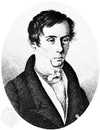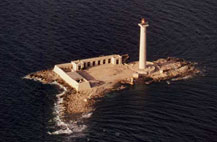
Augustin Jean Fresnel (10 May 1788 in Broglie - 14 July 1827 in Ville-d’Avray) was a French physicist. Founder of modern optics, he proposed an explanation of all optical optical phenomena within the framework of the wave theory of light. theory of light.
Biography: The son of an architect, Augustin Fresnel was born in Broglie, in the Eure department (27).
He entered the École Centrale Caen at the age of 13, then the École Polytechnique at the age of 16 and a half. In 1809, he became a member of the École Nationale des Ponts et Chaussées in the lighthouse department.
He became a member of the Académie des Sciences in 1823 and of the Royal Society, which awarded him the Rumford Medal in 1824.
Augustin Fresnel began his career by carrying out numerous experiments experiments on light interference, for which he coined the notion the concept of wavelength.
He calculated the so-called Fresnel integrals. His first proof was that two beams of light polarised in different planes have no interference effect. no interference effect.
From this experiment, he deduced that the wave motion of polarised light is transverse and not longitudinal (like that of sound) as had previously been thought. Finally, he was the first to produce circular polarised light. His so-called Fresnel formulae on refraction are still used today. In the field of applied optics, Fresnel invented the step lens used to increase the power of headlights. He died of tuberculosis in 1827 in Ville-d’Avray, near Paris.
Voir aussi :


- Les représentations de Fresnel
- Our program of Bicentenary od Fresnel’s Theory day


 ResearchGate
ResearchGate Flux RSS
Flux RSS